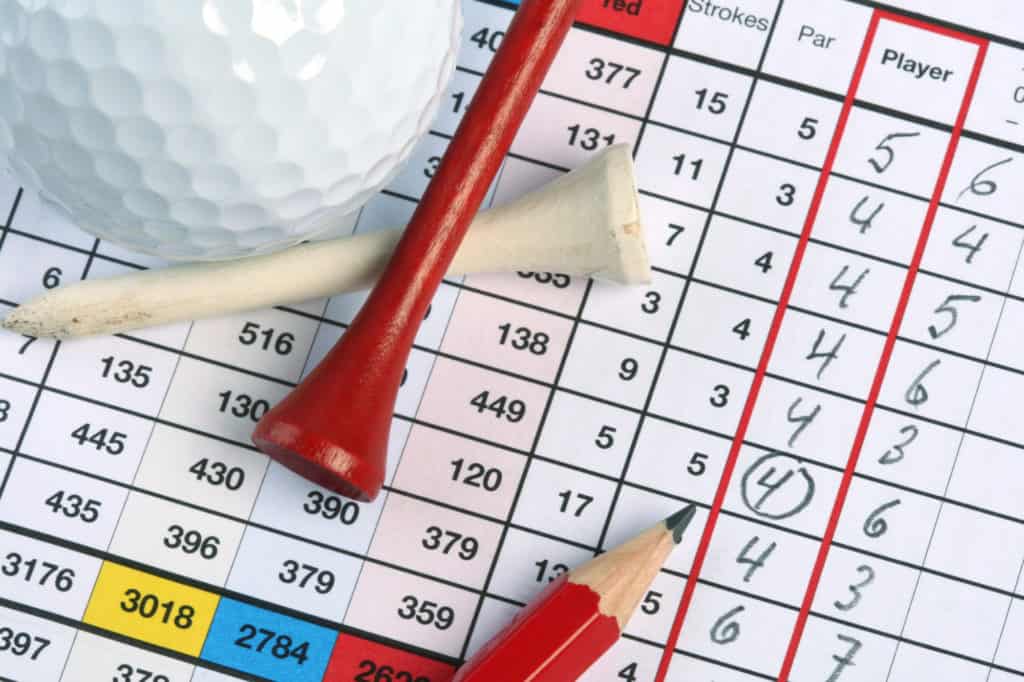
Regardless of how long you have been playing golf, you may be wondering how long it takes to get good at this sport.
There are many factors that come into play when it comes to getting better at golf.
Some people have a shorter road than others, but there are things you can do to help get better.
In this guide, we will help you determine how long it takes to get good at golf.
How Long Does It Take To Get Good At Golf

It takes years to get good at golf.
Although some people who are exceptionally talented and hard-working can learn the game in a year or so, most people will take many years.
Golf is complicated, and it involves more than just the physical side, there is a huge mental side to golf as well.
To truly understand the game, how it is played, how to move the golf ball around the course, and how to approach from a mental side takes 5-10 years of consistent work.
This should not be a deterrent for new people looking to get into the game.
What Is Considered A Good Golf Score?

To determine how long it takes to get good, it is essential to understand what “good” really is.
Good is a relative term when it comes to golf.
If you are a member of a high-end private country club with many successful and athletic people, good may mean that you are a scratch golfer.
If you are playing in a charity outing and you can drive the ball 260 yards, everyone may think that you are good, even if you can’t break one hundred.
As a general rule, many people believe that “good” in golf is being able to break 80.
When you can shoot 80 or less, you are getting around the golf course, making a lot of pars.
You will have lots of great shots and a few bad ones, but your game is usually somewhat consistent.
People who shoot 90 and above will have a lot of bad holes, some double bogeys, etc.
Anytime a golfer shoots under 80, their round will seem a bit less complicated, more in control, and generally make them appear as if they are a great golfer.
What Are Some Factors That Determine If You Will Be Good At Golf?

There are quite a few things that will determine how good you get at golf.
Some of these will be in your control, and others will be out of your hands.
We will break down these different concepts for you to try and help you understand some ways that you can potentially work on your game.
Hand-Eye Coordination
The better your hand-eye coordination, the easier time you will have reacting to the golf ball and making adjustments to your swing.
If you go and take a golf lesson and the teacher has you doing something new, some people can make an adjustment immediately.
Others will miss the golf ball until their body learns how to adapt.
Hand-eye coordination is a significant factor in becoming a great golfer.
Some people are born with this ability, and others work on it over time.
Hand-eye coordination can be improved, especially by participating in other sports and activities.
Even learning how to play tennis or ping pong can help you improve hand-eye coordination, which will help you be a better golfer.
Physical Strength
For many years people believed that golf was not even a sport.
They would say that it wasn’t physical enough to be considered an actual sport.
If you look at the professional golfers on tour today, you realize that this simply isn’t true.
Many of these players spend more time working in the gym then they do on the range.
They have nutrition regimes, and they make sure that every part of their body can work to swing the club as efficiently as possible.
You can see the difference as time as progressed in golf.
The consistent winners and competitors are people who are in excellent physical condition.
They don’t tire, they move up the leaderboards, and a great deal of it has to do with their health.
If you are a marathon runner and former hockey player, your road to being good at golf will be quicker.
If, however, you are have not done any physical exercise in your life, and you want to take up golf to help get you in shape, it may take a bit of time to get good.
This should not discourage non-athletic people from starting the game of golf.
It is just good to have an awareness that it may take a little while to become as good as the physically fit people.
Practice Time
It is nearly impossible to get better at golf without at least putting some time into practice.
The more time you can get in, the better you can get.
You need to make sure that your practice is effective.
Standing on a driving range, hitting thousands of golf balls is not going to make you a better golfer necessarily.
You will have to work on aiming, alignment, setup, strength, course management, and more.
The more factors you can incorporate into your practice, the more effective it will be.
Each time you swing a club, you should make sure you aim for something.
Don’t just work on hitting the ball work on learning to score as well.
In addition to practicing those long drives, it is imperative to work on the short game as well.
The better your short game, the easier it is to score.
If you can’t go to the driving range each day, try and hit a few putts on your carpet.
The more you work on these areas of your games, the easier it is to get better.
There is no set amount of time that you must practice to get good golf.
The time will vary depending on your natural abilities and the effectiveness of your practice.
However, if you are playing one round of golf per week, you should try and practice for an hour at some point during the week.
If you are playing two or three times per week, you will want to try and practice for at least two hours.
This is, of course, if you would like to get better and lower your scores.
If you are just playing for fun, you do not need to be as concerned about scheduling these practice sessions.
Scoring
Like many other sports, there is a lot of strategy in golf.
If you refuse to acknowledge this fact, then it will take you a long time to get great.
Many players will continue to go for a par 5 in two even though they have never completed this shot in their life.
The large pond that you always try and hit over even though you know you have no chance, these are poor course management skills.
If you want to get better, you need to learn how to score.
Sometimes scoring is about hitting a green in two and making a two-putt, and other times it’s about hitting a green in three and making one putt.
It would help if you were willing to see outside the box.
Hitting a three wood off a tee is not a bad idea if it keeps you out of trouble.
Learning to chip with different clubs, practicing shots out of tough lies, these are all things that will help you become better at scoring.
You can be the best ball-striker on the planet, but if you can’t score, you won’t be able to get good at golf.
Mental Game
The mental side of golf is something that everyone can work on regardless of your handicap or ability.
There are many golf books out there that get into more detail about how to be a smart mental golfer.
Golfers that have a positive mental outlook about their game and know how to manage negative thoughts will play much better.
As an example, when you stand on a tee box with a large pond in front, a great golfer will not even see that water.
A golfer that has not worked on their mental game at all will be saying, “don’t hit it in the water.”
As soon as you put this thought into your head, it will affect your ability to play the golf hole well.
The mental game of golf is going to take time to perfect.
It is something that even golf professionals learn and work with every day.
You will find some strategies that work for you and others that don’t, keep searching and keep working on thinking more clearly while playing.
Swing Awareness
To get good at golf, you have to have an understanding of how the golf swing works.
If you are still saying to yourself, “keep your head down,” then you may not fully understand all that goes into hitting a golf ball.
There is a lot to hit a golf ball correctly.
You do not need to be a Class A PGA Professional with a full understanding to get good, but you should have some idea of why a ball goes a certain way.
Why do you slice it?
These are all things that you will need to know to get good at golf.
If you are stuck out on the golf course slicing every single shot, and you have no idea how to fix it, things will get very frustrating.
Besides making you want to give up the game, golf will become a chore.
This does not have to happen.
The best way to get some swing awareness and understand what is going on with your game is to take a lesson.
A golf pro can give you a few good swing thoughts and help you understand what it will take to get to the next level.
You can then take these thoughts, work on them, study them, and apply them to your game to lower your scores.
Conclusion
The amount of time it takes to get good at golf will vary significantly based on the topics that we discussed.
As a general rule of thumb, you should assume that it will take a few years, and you will have to put in a few hours a week.
If you become serious and start practicing for an hour or even a half-hour every day, you will get good at a much faster pace.
Golf is supposed to be fun and enjoyable.
For some people, it is not enjoyable until the scores are reflecting that.
If you are struggling with something in your game or trying to lower your handicap, don’t forget to dedicate just as much time on the range as you do on the course.



Leave a Reply